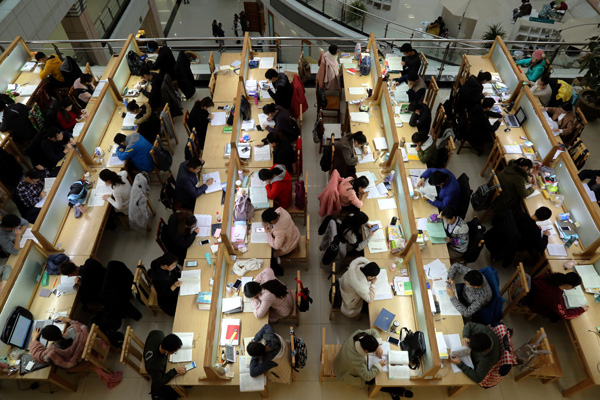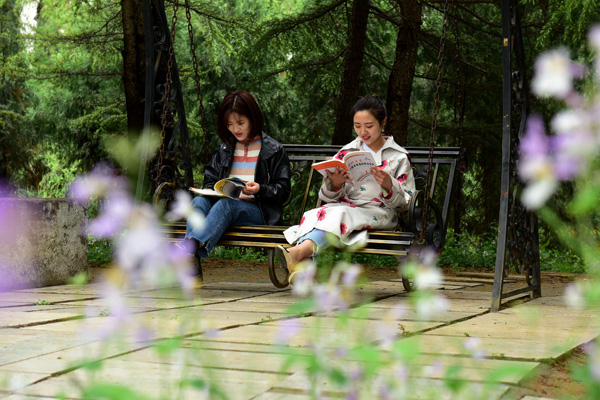Reading library trends


A library in Zhengzhou University, of Henan province, is fully occupied. [Photo provided to China Daily]
A report examining what books university students borrowed last year gives an insight into their interests. Liu Xiangrui reports.
A recent report based on university libraries' 2017 lending lists has started online discussions of such topics as how much-and what-young people are reading, around World Reading Day on April 23.
A growing number of university libraries are undertaking big data analyses of their lending records.
The report by the Chinese academic-resources platform Chinese and Foreign Academic Information, includes nearly 20 Chinese universities, including such top institutions as Peking, Tsinghua and Zhejiang universities.
The books and genres vary according to whether the respective university emphasizes arts or science. But trends still emerge.
Literary books are especially popular with students and account for about 30 percent of total lending, the report shows.
The most frequently checked-out books are from the mystery and romance genres. Some best-selling novels are also popular.
The novel Ordinary World by contemporary Chinese writer Lu Yao appeared more often than other titles on the list. It's a realistic story that describes the changes in contemporary urban and rural society over the years through a family's stories.
Online fictions like The Grave Robbers' Chronicle by Xu Lei, who's better known by his pseudonym, Nanpai Sanshu, and Things in the Ming Dynasty, a collection of semi-historical stories by online writer Shi Yue, were also prominent on the lists.
The data also show foreign fiction is particularly popular among college students.
Several works by Japanese writer Higashino Keigo, who's known for such mystery novels as The Devotion of Suspect X, are among the most borrowed books.
Titles by such other foreign authors as Haruki Murakami and Gabriel Garcia Marquez also enjoy huge popularity.
The report's results suggest Chinese students' habits are different from US university students, who favored The Republic by ancient Greek philosopher Plato and The Clash of Civilizations by US political scientist Samuel Huntington, according to data collected by the Open Syllabus Project in 2015.
"The readers are the true judges," Zhejiang's provincial library's director Chu Shuqing says.
"They choose books that allow them to truly enjoy reading."
Libraries should innovate to develop book-selection methods that help readers find good books.

Students at Hebei Academy of Fine Arts on World Book Day on April 23. [Photo provided to China Daily]
Zhu Anshun, a guest professor of the Chinese Culture Academy of Chongqing and director of the Zhonghua Book Co's classics-education center, says the frequent appearance of best-sellers, and online and foreign novels on those lists suggest young people have more diverse reading resources today.
"It's a positive phenomenon. It's quite OK that best-sellers and online novels have become the most popular books among university students," he says.
"But for literature majors, it's necessary to also read more essential classics from traditional culture, such as The Analects of Confucius."
He says it's good that students read novels out of interest but also believes that they also need a base in certain classical and liberal-education books.
Hangzhou University of Electronic Science and Technology's library director Chen Lin says the development of internet and mobile devices has diversified people's approaches to reading, so paper books' lending has conspicuously decreased in recent years.
There hasn't been a substantial drop in overall reading when digital forms are accounted for, she adds.
Tianjin Foreign Studies University graduate student Zhang Zhengya says she and her schoolmates don't frequently visit the library to borrow books.
The 25-year-old journalism major, who prefers serious reading, used to borrow three or four books a month as an undergraduate.
"I have less time to read (for pleasure) as a graduate student. When I go to the library now, I just find the book I want and leave rather than browse for interesting titles."
She and most students buy their favorite books, including e-books, online rather than borrow from the library, she explains.
"Then we don't have to worry about due dates and can read it whenever we want," she says.
A recent survey of over 900 university students by the China University Media Union finds 31 percent read less than half an hour a day; 42 percent read between half an hour and an hour and a half a day; and less than 10 percent read more than two hours a day.




